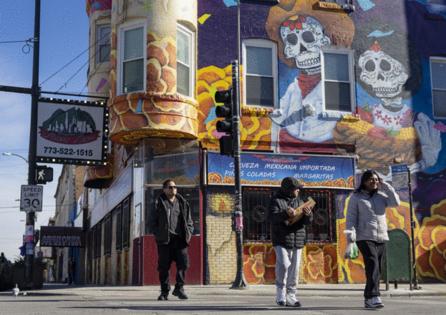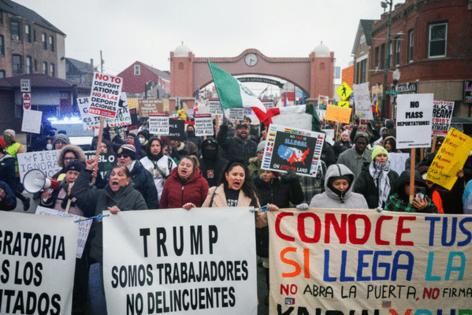Chicago ICE raids keep customers at home in city's Latino retail district
Published in News & Features
Chicago’s Dulcelandia candy store is usually packed with shoppers loading up on traditional sweets ahead of Mexican Independence Day. But just a few days before this weekend’s festivities, it was completely empty.
With President Donald Trump’s immigration raids spreading through the city, a large number of street vendors vanished from Little Village, an area known as “Mexico of the Midwest” that houses the second-busiest retail corridor in Chicago. Some workers have so far opted to stay home and tourists from neighboring states decided to skip the events this year.
For Marco Rodriguez of Dulcelandia (Spanish for “candy land”), the raids are a double whammy. Costs for the family business he runs had already gone up by at least 25% due to tariffs, he said, and now the raids are keeping shoppers away during a peak season. Sales across his four shops in Chicago are down more than 50% this year.
“On the corridor itself, all businesses have been affected, everyone’s feeling it,” Rodriguez said in an interview Wednesday at the chain’s shop in Little Village. “We’ve seen a drop, especially during these times, these last couple weeks, with what’s going on.”
Trump started his long-awaited Chicago crackdown this week, part of an escalating campaign against Democratic-run cities that the White House says are suffering from rampant crime and disorder. Immigration and Customs Enforcement agents launched an operation in the third-largest U.S. city on Sept. 8.
The president had also threatened to send in the National Guard, but eventually decided against it because his advisers warned him that going in without the cooperation of the state governor would create legal hurdles, CNN reported on Friday, citing anonymous sources.
Trump’s threats had drawn rebukes from Illinois Gov. JB Pritzker, a potential 2028 presidential candidate, and Chicago Mayor Brandon Johnson. Both have repeatedly said there’s no emergency that warrants federal troops and that the city and state will keep their sanctuary status, which prohibits local police forces from cooperating with federal immigration agents, though they can’t stand in the way.
On Friday, a man was shot and killed by an ICE agent during a vehicle stop in the Chicago area after he dragged the officer while attempting to flee in his car, according to authorities. Trump said on Friday that he plans to send troops into Memphis, Tennessee, but added he would have preferred to deploy them to Chicago.
ICE said it had arrested at least 13 people in the first two days of the operation in Chicago, including a 41-year-old from Kyrgyzstan, a 24-year-old from India and a 45-year-old from Mexico, according to a spokesperson.
Fear of raids in Little Village’s 2-mile retail corridor led to foot traffic falling by as much as 30% compared with the prior weekend, according to Jennifer Aguilar, who heads the local chamber of commerce. That’s exacerbating financial troubles for the 400 or so businesses in the area, she said.
“We’re definitely going to lose some businesses, that’s for sure,” Aguilar said in an interview. “I’m already seeing some of that because of the drop in traffic, but also the tariffs have affected them completely — they can’t compete anymore with bigger businesses, and a lot of them can’t even make their rent right now.”
Southwest of Chicago’s main business district, Little Village is dotted with taquerías, Mexican grocery stores and shops selling dresses for quinceañera parties, the celebrations that Latin American families hold for their 15-year-old daughters. It brings in more tax revenue than any other retail stretch in the city aside from the Magnificent Mile, the downtown shopping street that features luxury stores such as Saks Fifth Avenue and Burberry.
Laura Gutierrez, who runs the Nuevo Leon Restaurant on 26th Street, said business is down by as much as half on some days after the administration’s recent escalation of rhetoric around immigration. Workers are still showing up, but there are fewer customers.
Around the corner at Osito’s Tap, the speakeasy-style bar recently cut its schedule by five hours a week because of decreased traffic following the threats of an immigration crackdown, co-owner Mike Moreno Jr. said. Sales were already down as much as 50% since Trump took office, in part due to the economic slowdown, he said.
Little Village will hold a Mexican Independence Day parade on Sunday, opting to go ahead with plans even after a large downtown festival for the holiday was postponed due to concerns about ICE. But Osito’s won’t host its usual party with mariachis because it’s expensive and Moreno wasn’t sure enough people would show up.
Pritzker said he’s deeply concerned about how tariffs and immigration policies are affecting local businesses. On Wednesday, he walked through a manufacturing trade show, chatting with a company that said it wasn’t able to import necessary products due to high tariff costs.
“This is equipment that small businesses on the ground in our state need, and now those small businesses are paying more for this equipment by sometimes 20% or 30%,” Pritzker said.
Flower shops are also being hit “super hard right now” due to escalating tariffs, said Aguilar. The majority of fresh flowers sold in the U.S. are imported from countries such as Colombia, Ecuador and the Netherlands.
“I talked to a flower shop last week. She said that because of the tariffs, now she has to give her dozen of roses for $50,” Aguilar said. “Nobody’s going to pay $50 so she said that, basically, people just go to Costco.”
Safety concerns
Alderman Mike Rodriguez said organizers and local officials have ramped up security ahead of Sunday’s parade in Little Village, coordinating with Chicago police, other agencies and nonprofits.
“We want to make sure that people who don’t feel safe know that it’s okay not to come, but we want to encourage everyone who does feel safe to come,” he said.
Arne Duncan, the former U.S. education secretary under President Barack Obama, said he will be there with a team from the anti-gun violence nonprofit he co-founded, called Chicago CRED.
“We want to be supportive,” he said. “We are there, whether or not ICE shows up.”
At Dulcelandia, papier-mache piñatas are lined up at the front part of the store ahead of the festivities. They’re popular for parties because they can be filled with candy and then struck with a bat until the treats fall out. Marco Rodriguez, who runs the business, sells them in a number of shapes and sizes, including a wide variety of Disney characters.
But the current bestsellers, he said, are Trump and ICE agents.
©2025 Bloomberg L.P. Visit bloomberg.com. Distributed by Tribune Content Agency, LLC.










Comments